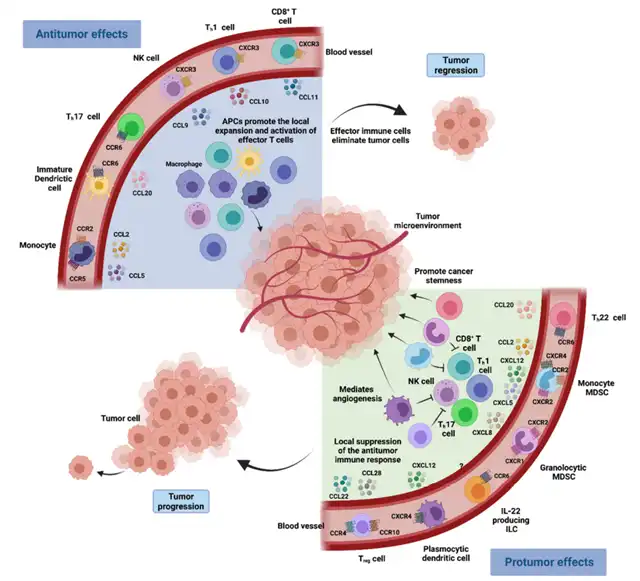What is Chemokines in Tumor Immune Therapy?
- Normal Liver Cells Found to Promote Cancer Metastasis to the Liver
- Nearly 80% Complete Remission: Breakthrough in ADC Anti-Tumor Treatment
- Vaccination Against Common Diseases May Prevent Dementia!
- New Alzheimer’s Disease (AD) Diagnosis and Staging Criteria
- Breakthrough in Alzheimer’s Disease: New Nasal Spray Halts Cognitive Decline by Targeting Toxic Protein
- Can the Tap Water at the Paris Olympics be Drunk Directly?
What is Chemokines in Tumor Immune Therapy?
- Should China be held legally responsible for the US’s $18 trillion COVID losses?
- CT Radiation Exposure Linked to Blood Cancer in Children and Adolescents
- FDA has mandated a top-level black box warning for all marketed CAR-T therapies
- Can people with high blood pressure eat peanuts?
- What is the difference between dopamine and dobutamine?
- How long can the patient live after heart stent surgery?
What is Chemokines in Tumor Immune Therapy?
Chemokines play a crucial role in tumor immune therapy, acting as factors responsible for immune cell transport and lymphoid tissue development.
Currently, there are reports of 50 different chemokines, classified into four major subfamilies based on the position of the first two cysteine (C) residues in their main protein structure: C, CC, CXC, and CX3C chemokines.
Role of Chemokines in Tumor Immunity:
Chemokines are vital in guiding the migration of immune cells, influencing the immune characteristics of the tumor microenvironment (TME).
They direct immune cells towards tumor cells, impacting processes such as angiogenesis, metastasis, cancer cell proliferation, stemness, and invasiveness.
Chemokines act as key determinants in disease progression, significantly affecting patient prognosis and treatment response.

Recruitment of Immune Evasion and Immune Suppressive Cells:
Chemokines play a pivotal role in guiding immune cells’ migration, which is essential for initiating and sustaining effective anti-tumor immune responses. Aberrant distribution of chemokines in the TME can promote the differentiation and infiltration of immune suppressive cells (Treg cells, MDSC, and TAM) into the tumor.
Different immune cell subgroups express distinct patterns of chemokine receptors, leading to diverse responses based on specific environmental needs. Treg cells, for instance, express high levels of the chemokine receptor CCR4, responding to CCL22 produced by TAM and primary tumor cells. Similarly, TAMs and MDSCs are recruited to the TME through the CCL2-CCR2 signaling pathway. Other chemokines, such as CCL5, CCL7, CCL15, CXCL8, and CXCL12, also contribute to the recruitment of immune cells to the tumor.
Involvement in Tumor Growth and Progression:
Chemokines participate in tumor growth and progression through various mechanisms. Chemokine receptors expressed on cancer cells can directly activate signaling pathways, leading to cancer cell proliferation. Moreover, chemokines contribute to maintaining cancer cell survival by disrupting the balance between pro-apoptotic and anti-apoptotic proteins.
Certain immune cell-derived chemokines, like IL-22 from TH22 cells, support tumor development by increasing cancer cell stemness and tumorigenic potential. The interaction between chemokines and their receptors on cancer cells and immune infiltrating cells exacerbates these effects.
Angiogenesis:
Chemokines and their receptors are considered critical regulators of the tumor vascular system, with a dual role in angiogenesis. ELR+ CXC chemokines, like CXCL1 and CXCL8, promote angiogenesis, while ELR− CXC chemokines, such as CXCL4 and CXCL10, are considered angiogenesis inhibitors.
Chemokines interact directly with endothelial cells through their receptors, enhancing migration, proliferation, and survival. Additionally, chemokines indirectly enhance angiogenesis by promoting the recruitment of leukocytes that produce angiogenic factors. Some chemokines, like CXCL9, CXCL10, and CXCL11, may recruit cells with anti-angiogenic functions.
Facilitating Tumor Metastasis:
The chemokine system plays a crucial role in tumor metastasis, influencing the specific sites of cancer cell migration. The CXCL12/CXCR4 axis has been identified as a key factor in tumor metastasis, confirmed in various cancers. Other chemokines involved in metastasis include CCR7, CCL28, CCR10, CCL27, and CXCR5, each interacting with specific ligands to mediate cancer cell migration to different organs.
Targeted Therapies:
Several drugs targeting chemokine receptors have been approved for clinical use, showing promising results in treating hematologic malignancies. These include anti-CCR4 antibodies like Mogamulizumab and CXCR4 antagonists like Plerixafor (AMD3100).
Ongoing research focuses on developing therapies targeting various chemokine receptors, such as CCR1, CCR2, CCR4, CCR5, CCR7, CXCR2, and CXCR4. These therapies, either as monotherapies or in combination with conventional treatments, demonstrate significant potential in preclinical and clinical studies.
Conclusion:
The intricate role of chemokines in tumor immunity highlights their potential as powerful targets for immunotherapy.
Understanding the complex interactions between chemokine receptors and their ligands in the tumor microenvironment is crucial for developing effective treatment strategies.
Despite challenges, ongoing research on chemokine receptor inhibitors shows promise in improving treatment outcomes, either alone or in combination with conventional therapies or immune checkpoint inhibitors.
Further exploration and development of predictive clinical models are necessary for the successful implementation of chemokine-based immunotherapies in cancer treatment.
What is Chemokines in Tumor Immune Therapy?
(source:internet, reference only)
Disclaimer of medicaltrend.org
Important Note: The information provided is for informational purposes only and should not be considered as medical advice.



